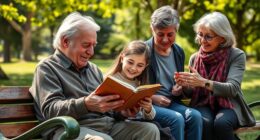Ten great group activities to strengthen social bonds among the elderly include group exercise classes, arts and crafts workshops, book clubs, and technology-assisted socializing. You can also enjoy volunteering opportunities, cooking classes, game nights, gardening clubs, and outdoor activities. Don’t forget about senior-friendly outings and trips to foster connection and shared experiences. These activities not only enhance social ties but also boost mental and emotional well-being, leading to a happier, healthier lifestyle. Discover more ways to engage! These engaging experiences cater to a variety of interests, ensuring that every senior finds something enjoyable. From the lively discussions in book clubs to the collaborative spirit in cooking classes, seniors love social activities that not only stimulate their minds but also create lasting friendships. Encouraging regular participation in these gatherings can lead to a stronger sense of community and increased joy in daily life.
Key Takeaways
- Group exercise classes promote physical health while fostering social interaction and accountability among seniors, enhancing their sense of community.
- Music and dance events create joyful experiences that boost emotional well-being and strengthen social bonds through shared enjoyment.
- Gardening clubs and outdoor activities encourage teamwork and connection with nature, reducing stress while beautifying shared spaces and fostering friendships.
- Arts and crafts workshops provide creative outlets that enhance cognitive skills and promote collaboration, strengthening relationships among participants.
- Volunteering opportunities allow seniors to engage with their community, build connections, and find purpose by sharing their skills and experiences.
Group Exercise Classes

Group exercise classes are a fantastic way for seniors to stay active and engaged.
These fitness classes, like chair yoga and water aerobics, cater to your needs by improving mobility and strength with minimal joint pressure. As you participate, you'll find that social interaction flourishes, leading to friendships and essential support systems among participants.
Regular attendance not only boosts your physical health but also enhances your mental health by reducing feelings of loneliness. Many local fitness centers offer tailored low-impact options, encouraging ongoing activity in a friendly environment.
Plus, the group setting provides motivation and accountability, making it easier for you to maintain a consistent fitness routine and improve your overall well-being. Additionally, engaging in pet therapy can further enhance emotional well-being by providing companionship and reducing feelings of isolation.
Arts and Crafts Workshops

Arts and crafts workshops offer you a fantastic way to express your creativity while keeping your mind sharp. By participating in activities like painting or knitting, you can boost your cognitive skills and enhance your self-esteem. Plus, these workshops help you build social connections as you collaborate with others who share your interests. Engaging in creative activities can also serve as a form of emotional processing, allowing participants to reflect on their experiences and foster healing.
Creative Expression Benefits
Creative expression through workshops offers a vibrant outlet for older adults, enhancing their mental well-being and combating feelings of loneliness. Engaging in arts and crafts, like painting or knitting, promotes mindfulness and reduces stress, greatly boosting emotional health.
As you participate in collaborative projects, you'll forge social connections, fostering community building and allowing you to share ideas and experiences with others. This supportive environment not only enhances your self-esteem but also provides a sense of accomplishment, especially for those facing isolation. Additionally, incorporating elements from herbal remedies can further promote overall health and vitality, enriching the creative experience.
Cognitive Stimulation Opportunities
Participating in workshops not only releases your artistic side but also provides significant cognitive stimulation. Engaging in arts and crafts activities helps enhance your cognitive function, improving memory and problem-solving skills.
Whether you're painting, knitting, or working with pottery, these creative expressions can boost your self-esteem while allowing for fine motor skill development, which is especially beneficial if you have arthritis.
Furthermore, these workshops serve as a relaxing yet productive pastime that can help reduce feelings of isolation. As you immerse yourself in these activities, you'll also experience improved emotional well-being. Additionally, engaging in hands-on learning through creative projects can further enhance cognitive development.
Many local non-profits and senior centers offer accessible workshops tailored to all skill levels, making it easy for you to reap the benefits of creativity.
Social Bonding Through Collaboration
While you immerse yourself in arts and crafts workshops, you'll find that collaboration fosters meaningful social connections among participants. These activities not only boost creativity but also enhance communication, helping to combat loneliness and feelings of isolation. Working together on projects allows you to share experiences, build community ties, and create a supportive environment. Additionally, engaging in these creative activities can promote cognitive skill enhancement, which is essential for maintaining mental agility and social interaction in older adults.
| Benefits of Arts and Crafts Workshops | Description |
|---|---|
| Social Bonding | Strengthens relationships among peers |
| Collaboration | Encourages teamwork and shared goals |
| Enhance Communication | Facilitates open dialogue |
| Combat Loneliness | Provides companionship |
| Boost Self-Esteem | Promotes a sense of accomplishment |
Book Clubs and Reading Groups

Joining a book club can open up a world of shared storytelling experiences, where you connect with others over engaging narratives.
You'll enrich discussions by exploring diverse perspectives, especially in cross-generational settings.
Plus, choosing accessible books guarantees everyone can comfortably enjoy the reading experience together.
Shared Storytelling Experiences
Book clubs and reading groups create a vibrant space for shared storytelling, where seniors can connect through literature and discussion. Engaging in these reading groups fosters social interactions, allowing you to express personal interpretations and experiences related to the stories.
This exchange not only promotes emotional connections but also enhances cognitive function, keeping your mind active. Additionally, participating in these groups can help reduce feelings of loneliness and isolation, similar to the benefits of financial settlements in fostering stability during transitions.
- Reduce feelings of loneliness and isolation.
- Form new friendships and strengthen existing ones.
- Experience a sense of belonging in a supportive community.
Diverse Perspectives Enrichment
Engaging in shared storytelling experiences naturally leads to exploring diverse perspectives in book clubs and reading groups. These gatherings promote social interaction and allow you to engage in critical thinking and the exchange of personal interpretations. By sharing insights, you foster emotional support, which combats isolation and enhances your overall mental well-being. Cross-generational discussions enrich conversations, letting you learn from others' life experiences. Additionally, participating in such groups can help combat feelings of loneliness, which is crucial for maintaining mental well-being as one ages.
| Benefits | Activities | Outcomes |
|---|---|---|
| Social Interaction | Group Discussions | Enhanced Connections |
| Diverse Perspectives | Reading Diverse Genres | Broadened Horizons |
| Cognitive Function | Analyzing Themes | Improved Mental Agility |
Joining a local library or community center's reading group is an excellent way to connect with peers who share your passion for literature!
Accessibility in Book Selection
To guarantee everyone feels included in book clubs, selecting accessible reading materials is essential. By prioritizing accessibility, you can ascertain that older adults fully enjoy the experience. Here are a few strategies:
- Choose books with larger font sizes and clear print to accommodate visual impairments.
- Include diverse genres to engage varied interests and spark broader discussions.
- Incorporate audiobooks for those who find traditional reading challenging.
Don't forget to provide summaries or discussion questions for each book, promoting understanding and participation.
Local libraries are a fantastic resource, often offering large print versions of popular titles.
Technology-Assisted Socializing

Technology-assisted socializing plays an essential role in enhancing your social interaction. By using platforms like video calls and social media, you can maintain connections with family and friends, fostering a sense of community. These interactions help reduce loneliness and improve your mental health, as regular communication encourages engagement with others.
Voice-activated devices make it easier for less tech-savvy seniors to connect with loved ones and access online resources. Additionally, programs designed to teach you how to engage with technology empower you to explore new social opportunities. Embracing technology can greatly enhance your overall quality of life. Moreover, the greatest happiness principle suggests that fostering social connections contributes significantly to individual well-being and community happiness.
Volunteering Opportunities

Volunteering can be a rewarding way for seniors to stay active and connected while making a positive impact in their communities.
Engaging in volunteer work offers various opportunities that not only enhance cognitive health but also reduce feelings of depression. It provides a strong sense of purpose and fosters social connections, allowing you to meet others who share your passions.
Here are some volunteering opportunities to contemplate:
- Mentoring youth at local schools or community programs
- Assisting at food banks or shelters
- Participating in local senior centers for community service projects
Music and Dance Events

Music and dance events create a vibrant setting where seniors can socialize and enjoy themselves, greatly boosting emotional well-being. These activities foster strong social bonds, helping to alleviate feelings of loneliness.
When you participate in dance, you not only improve muscle strength and balance but also enhance your physical health. Sharing music evokes positive memories and emotions, making it a therapeutic experience, especially for those experiencing cognitive decline.
Community centers and local organizations frequently host these engaging events, offering you opportunities to connect with others in a lively social atmosphere. Engaging in music and dance not only relieves stress but also contributes to your overall well-being, enriching your life and building lasting friendships.
Cooking and Baking Classes

Cooking and baking classes offer seniors a fun way to enhance their culinary skills while connecting with others. These classes promote healthier eating habits by focusing on nutritious cooking tailored to specific dietary needs.
You'll enjoy social interaction as you engage in shared experiences, exploring diverse cuisines and techniques in a supportive environment.
- You'll create delicious meals together, fostering a sense of accomplishment.
- Sharing meals reinforces connections, making you feel more socially connected.
- Community centers often provide these classes, ensuring accessibility for everyone.
Participating in cooking and baking classes not only hones your culinary skills but also strengthens bonds with fellow participants, making it a delightful way to enrich your social life. Additionally, engaging in regular exercise can contribute to overall health and enhance your experience in these classes.
Game Nights and Puzzles

Game nights and puzzles offer a delightful way for seniors to socialize and engage their minds.
These gatherings foster social engagement through friendly competition in games like bridge, chess, and trivia, which also encourage strategic thinking. By participating in multiplayer games, you'll enhance social bonds and experience shared laughter, improving your overall well-being and helping to reduce isolation.
Solo games, such as crossword puzzles and solitaire, stimulate cognitive function, maintaining mental acuity and potentially slowing cognitive decline.
Regularly scheduled game nights create a sense of routine and community, ensuring you consistently connect with peers.
Additionally, group puzzles present opportunities for teamwork and collaborative problem-solving, leading to a satisfying sense of accomplishment upon completion. Furthermore, engaging in such activities can be an effective way to practice mindfulness techniques, enhancing present-moment awareness and reducing stress.
Gardening Clubs and Outdoor Activities

Gardening clubs offer you a wonderful way to connect with nature and enjoy the therapeutic benefits of nurturing plants.
By participating in these activities, you not only enhance your mood but also bond with others in your community, creating lasting friendships.
Plus, working together on community gardening projects helps strengthen those ties while beautifying shared spaces.
Therapeutic Nature Benefits
While many activities can enhance well-being, engaging in gardening clubs and outdoor activities offers unique therapeutic benefits for the elderly.
These activities don't just provide joy; they also help reduce stress and improve physical health. You'll find that connecting with nature enhances your mood and encourages social interaction, fostering camaraderie among fellow members.
- Gardening can boost your mobility and cardiovascular health.
- Nature walks are great for decreasing blood pressure and anxiety.
- Community gardens offer chances for collaboration, bridging the generational gap.
Community Engagement Opportunities
Engaging in community activities can greatly enhance your social life and overall well-being. Participating in gardening clubs and community gardens offers you a wonderful opportunity for social interaction.
As a senior, you'll find that working alongside others while planting, maintaining, and harvesting not only promotes physical activity but also fosters friendships with fellow members. These hands-on experiences provide a therapeutic outlet, helping to reduce stress and improve your mental health.
Additionally, outdoor activities like nature walks or park clean-ups keep you active and connected with peers who share your interests. By engaging in these activities, you'll cultivate both fresh produce and meaningful relationships, creating a strong sense of community that enriches your life.
Senior-Friendly Outings and Trips

Senior-friendly outings and trips offer a fantastic way for older adults to connect with others while exploring new places. Organized excursions from senior centers, like museum visits or nature walks, cater to various interests and mobility levels.
These community trips not only encourage you to explore and learn but also help reduce feelings of isolation and loneliness.
- Many outings include transportation arrangements, making it stress-free.
- Engaging in these activities fosters camaraderie among participants.
- Exploring new environments together contributes to positive well-being.
Frequently Asked Questions
What Are Social Activities for Elderly People?
When it comes to social activities for elderly people, think about engaging options that promote interaction and fun. You might consider joining a local book club, participating in game nights, or attending arts and crafts workshops.
Volunteering is another great way to meet others while giving back to the community.
Don't forget about exercise classes like chair yoga or water aerobics, which can improve health and foster friendships in a relaxed environment.
What Are Group Activities for Elderly People?
When you think about group activities for elderly people, consider options like exercise classes or gardening clubs that keep them active and engaged.
Arts and crafts workshops can spark creativity, while book clubs and game nights encourage social interaction and intellectual stimulation.
Volunteering offers a sense of purpose, and music or dance events create joyful connections.
These activities not only enhance their well-being but also build lasting friendships among participants.
How Do You Encourage an Elderly Person to Socialize?
Think of a garden; each flower needs sunlight and water to bloom.
You can encourage an elderly person to socialize by inviting them to join activities that spark their interests. Suggest a book club or a painting class, where they can connect with others over shared passions.
Offer to help them navigate technology for virtual chats, too. By planting these seeds of connection, you'll cultivate a vibrant social life that flourishes with joy and companionship.
How to Keep the Elderly Socially Active?
To keep the elderly socially active, encourage them to join local clubs or classes that align with their interests.
Promote participation in group exercises, arts and crafts, or book clubs, as these foster connections.
Suggest volunteering in the community to give them a sense of purpose.
Additionally, help them use technology like video calls or social media to stay connected with family and friends, reducing feelings of isolation and enhancing their overall well-being.
Conclusion
Incorporating these engaging activities can truly transform the lives of the elderly. By fostering friendships and fun, you'll help create a community of connection and camaraderie. Whether it's through creative classes, thrilling trips, or delightful dinners, each experience adds joy and strengthens social bonds. So, let's ignite interest, inspire involvement, and encourage elderly empowerment through these enriching experiences. Together, we can build a brighter, more vibrant social scene for our seniors!









